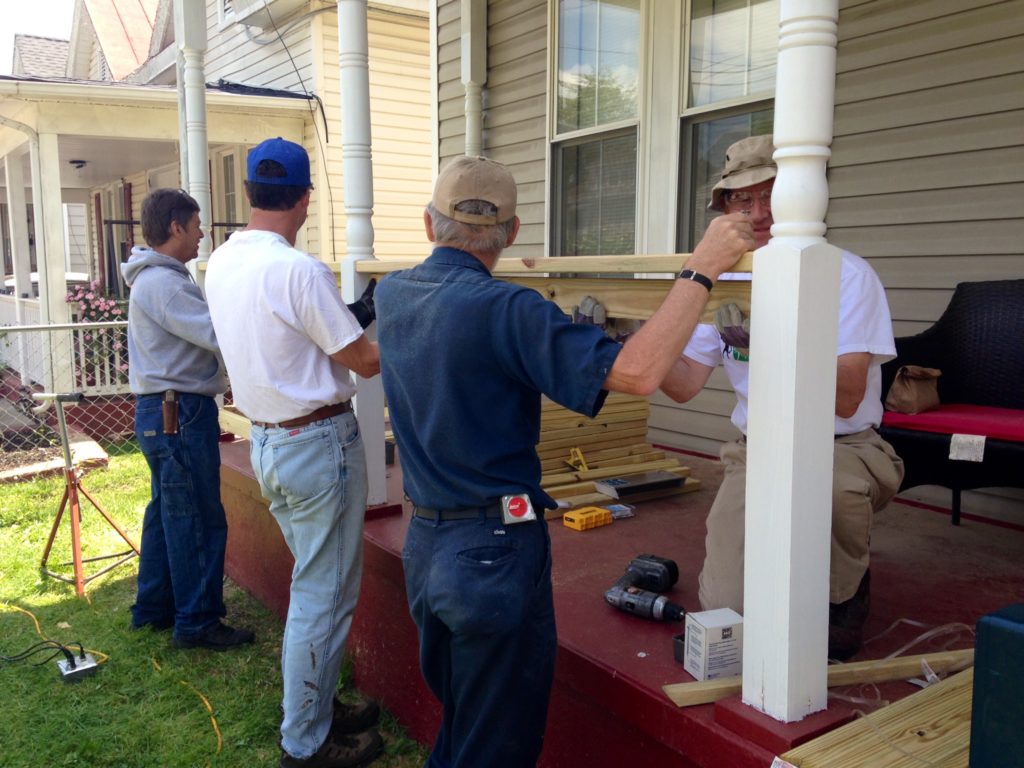Shortly after serving in World War II, Bev Cosby moved to Washington, DC, where he completed his undergraduate degree at American University. While there, he became involved in a church started by his brother, Gordon, named Church of the Savior. Bev had a call and a growing vision that the church should be all inclusive as he witnessed in the Church of The Savior and he envisioned an increased cooperation among all churches. When Bev moved back to Lynchburg, he worked to create the community he envisioned. Initially, Bev, his brother Jack and other family members, along with Jim Ould and other friends, formed Lynchburg Christian Fellowship (LCF) in 1950; then four

years later, formed the Church of the Covenant. In 1966, another of Bev’s brothers, P.G. Cosby, III, was called as the first paid director of LCF. In 1974, LCF changed its name from “Lynchburg Christian Fellowship” to “Lynchburg Covenant Fellowship” to include the Jewish community which was very active with LCF.
Through LCF, one of Bev’s first visions was to provide recreational space in the Boonsboro area. This community was developing rapidly and he wanted to preserve some land where children in the neighborhood could play. Initially, several acres of land were donated by his parents for this purpose. Additional land has been donated and/or purchased over the years to make up the approximately 40 acres still owned by LCF today. LCF held a program for neighborhood children at the Boonsboro Road location, known as the LCF Day Camp. This camp was integrated in the sixties.
The sixties were turbulent times in our country. Prince Edward County, Virginia chose to shut down its entire public school system for five years rather than integrate it. Events such as this raised the consciousness of those in Lynchburg concerning the needs of inner city children and disadvantaged families.
Seeing the injustice of what was happening in Prince Edward County, and elsewhere during this time, four ministers came together to pray and discuss what they could do to meet the needs of the people in Lynchburg’s inner city.
In the Spring of 1966, these four ministers, Bev Cosby (Church of the Covenant), Doug Oldenburg (Covenant Presbyterian), James Pannell (Jackson Street United Methodist) and Alex Robertson (St. Paul’s Episcopal) came together to discuss the problems within the city. As a result of these meeting and visits to other areas of the state, a recreational summer program and tutorial program for inner city children was started. The program met in a house at 412 Madison St. in Lynchburg. The staff named this house “Kum-Ba-Yah” after the African folk song and the summer and tutoring programs became known as the Kum-Ba-Yah programs.
In addition to the four charter churches named above, other congregations in the community soon joined as sponsors of Kum-Ba-Yah. A Kum-Ba-Yah Steering Committee was formed with two representatives from every sponsoring congregation meeting monthly. By 1982 Kum-Ba-Yah had become its own organization independent from LCF with 29 sponsoring congregations.
Identifying many other needs of the inner city, the Kum-Ba-Yah program expanded to include the first infant care center in Lynchburg which was located in St. Paul’s Episcopal Church Carriage House, sewing classes for women, a program for the visually handicapped, programs that assisted adults with personal needs such as meals, transportation, employment, debt counseling, housing, furniture and referrals to other agencies which could best assist a family.
Many “task forces” were initiated through Kum-Ba-Yah and LCF to address the crises of the times and the needs of families and their children.
By 1982, Kum-Ba-Yah Association became independent from LCF. In 1991, Kum-Ba-Yah Association changed its name to Interfaith Outreach Association (IOA) to better identify its “interfaith” mission.
IOA continued its mission of responding to the needs of our neighbors by developing programs that provided education, guidance and support. IOA is responsible for the spin off of three well known entities today including the Greater Lynchburg Habitat for Humanity, MedsHelp (a prescription program which has joined the Free Clinic of Central Virginia), and the Adult Care Center of Central Virginia.
